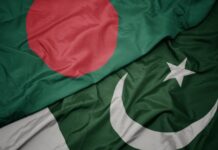The Pakistan Army Chief General Qamar Bajwa visited Paris, France this month to attend the Eurosatory International Defence and Security Exhibition from June 13th to June 17th, 2022.
But to everyone’s surprise in the International and especially the Pakistani media, there was no mention of this visit or the meetings he held, with no press release issued by the Pakistani military media wing. Insiders say he kept a very low profile and did not even attend official dinners by the French organizers of the exhibition.
Sources close to the Pakistan embassy say that the country’s mission (which lacks an ambassador due to poor Pak-French relations) was apparently not even involved in the visit. “General Bajwa probably kept a low profile in France so not to upset the Islamist extremist groups back home, which consider France a blasphemous country,” observed a reporter working in Paris for Pakistani media.
At the forefront of such anti French Islamist extremist groups that General Bajwa does not want to upset is Tehreek-e-Labbaik Pakistan (TLP), a political party that is known to have close links to the Pakistani military. Efforts to ban the party on terror charges by Pakistan’s civilian leadership have failed and in recent years the TLP has gained more popularity in the country, becoming an electoral force that has won seats in the parliament.
THE EMERGENCE OF TLP
TLP first emerged to the scene as a pressure group against former Prime Minister Nawaz Sharif’s government in 2017. The ex-PM is known for his opposition to the military, and was ousted from power in 1999 in a military coup and sent into exile by General Pervez Musharraf, the then Pakistan army chief (who ruled the country from 1999 to 2008 until his own ouster).
Fast forward to 2017 – Sharif returns to power and once again becomes a headache for the military. So to weaken his government, the military reportedly orchestrated protests against the government, unleashing the Islamist group TLP this time, which made up claims that some government ministers had committed blasphemy. Eventually the Sharif government gave in to the demands of the extremist group, and fired one of its ministers to placate the protesters. But they only went home after the military stepped in and gave “assurances”.
In 2018, the Islamist party received more than two million votes in the general election, showing its strength across Pakistan.
TLP AND ANTI FRANCE CAMPAIGNS
The Islamist group then made headlines after it launched a campaign against France when Paris-based satirical magazine Charlie Hebdo republished cartoons depicting Prophet Mohammed – an act deemed blasphemous by Muslims. The cartoons were reprinted to mark the beginning of the trial against those involved in the attack at the magazine Paris headquarters in 2015.
In response, the TLP took the streets and demanded the expulsion of the French ambassador in Islamabad, and an end to Pak-French diplomatic ties. It almost stormed the French embassy in Islamabad during the protests that left several people dead and paralyzed the capital city. Eventually, the Islamist group agreed to back off after the then government of Prime Minister Imran Khan promised to take up their demands in the Pakistani parliament.
But just like in 2017, the group suddenly fizzled out, which many say was because the military became involved again. It is unclear whether the military orchestrated these protests to teach Khan’s government a lesson (which finally got ousted allegedly by the military earlier this year) or did the Pakistan Army want to settle a score with France, as the two countries have had a turbulent relations since the early 2000s when 12 French submarine engineers were killed in a suicide bombing attack in the southern Pakistani port city – Karachi. There are reports that suggest that terrorists who killed the engineers may have had linkages to the Pakistani military, and carried out the attack in revenge against the French government, after it refused to pay kickbacks to officials in Pakistan for awarding contracts to French companies.
DID BAJWA ASK ISPR TO STAY MUTED?
Owing to such history between the two countires – in the past and in recent times, it appears that the Pakistan Army Chief deliberately kept a low profile when he was in Paris and may have instructed his PR machine to stay quiet about it and not share it with the media, as is the case, normally when he goes on a visit internationally. Furthermore, it appears the general did not want to attract the attention of Pakistani Islamist groups, especially at a time when he is already facing backlash in the country for orchestrating the fall of Imran Khan’s government.
